MRRL Hall of Fame
JOEY DAY and THE DARES
- Details
- Category: Inductees
- Created: Wednesday, 26 June 2013 07:33
- Written by Gary Johnson
Formed on the east side of Dearborn, Michigan, Joey Day and The Dares became the second MRRL inductee to have recorded at Fortune Records, the Motor City’s legendary independent record label. Owners Jack and Devora Brown, who were white, produced a wide variety of musical styles in their rather primitive studio. It was located in the rear of a cinder block building at 3942 Third Avenue near Hastings Street in Paradise Valley, an area of black-owned businesses, social institutions, and night clubs. Brownsville Station’s Cub Koda described the importance of the Fortune label best: “Fortune Records is the great secret record company in the history of Detroit rock ‘n’ roll. Any discussion without mentioning them is totally inaccurate and incomplete.”
Although Joey Cyers was born in Detroit in 1943, he was raised in East Dearborn, an area with strong Polish, Italian, and Arabic ethnic ties. Joey’s dad drummed in numerous big bands in Detroit and could often be heard on the radio, especially on Friday evenings. 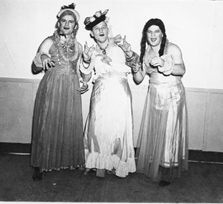 Joseph Cyers Sr. (middle) performing in a pantomime number in Detroit
Joseph Cyers Sr. (middle) performing in a pantomime number in Detroit
Joey grew up banging on his dad’s kit in the basement, and it was his father, Joseph Sr.,who first taught him the basics of drumming. Pantomime stage shows were popular entertainment in Detroit during this time. Joey’s father performed in many of the musical productions that featured slapstick comedy and dancing, topical humor, and gender-crossing dressing by the entertainers. Joey remembered his dad dressing as Carmen Miranda while playing music in one such production.
After being born in the Lebanese section of South Dearborn, Omar Tame moved to Joey’s neighborhood when he started school. The two played together in school bands at both Woodward Junior High and Fordson High, and their friendship blossomed over a shared love of music. Omar played tenor sax and trombone in school while Joey played drums. Both went on to play in Fordson's jazz band, dance band, and marching band.
At the age of fourteen, Joey and his friends Stan Topij and Richard Kolinowski got their first professional gigs in Miley's Polka Boys; but the rock and roll bug had already bitten them. They had seen early Detroit rocker Danny Zella perform at dances in Dearborn, and Zella’s recording of “Wicked Ruby” was the first 45 that Cyers ever purchased. Joey looked up to Cozy Cole as a drumming idol during the 50’s, and he and Topij loved the popular rock and roll instrumentals of the day; “Raunchy” by Bill Justis, “Tequila” by The Champs, and “Honky Tonk” by Bill Doggett.
The basement of the Cyers' home quickly became the site of jam sessions that often ran late into the night. Joey's parents were very tolerant of the young men playing music in their home at all hours. Cyers' mother, Josephine, would make food for the boys and his dad would sometimes come downstairs and sit in on the drums. 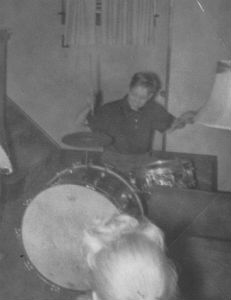 Young Joey playing his father's drum kit in the basement
Young Joey playing his father's drum kit in the basement
The first edition of what would eventually evolve into Joey Day & the Dares was the instrumental combo that Cyers formed with Eddie Bramblett, Roger Saad, and Richard Kolinowski in 1959. They performed regularly at the Brown Derby, a popular teen club in Garden City. They often shared the stage with The Royaltones, a five-man band also from Dearborn. The Royaltones were formed by sax player George Katsakis in 1957, and had a national # 17 hit in late 1958 with “Poor Boy” on Jubilee Records.
Cyers met Cliff Bramlett in 1961 at the Detroit Autorama car show. Bramlett was playing solo, and Cyers was impressed by a Bo Diddley-styled number he performed called “Goodbye Bo”. Cyers and Bramlett soon started working together. Often accompanied by a black guitarist named Willie Fleming, they played at all the downriver bars. Cyers and Bramlett also played in many of Detroit’s blind pigs, the city’s after-hours drinking establishments where they were often the only white faces in the room. In addition, the pair played regular gigs with Jimmy James and the Del Keys at the West Fort Tavern in Detroit.
Stan Topij had joined The Royal Playboys, an instrumental band formed by Mike Hedgi in East Dearborn. Topij played both accordion and organ in the group which also featured his cousin, Stan Petriw, on sax and clarinet. Besides playing gigs on their own, the Royal Playboys also served as the backing band for a black vocal group from Detroit called The Dynamics. The band had already recorded a single with the group in 1962; “Delsina” b/w “So Fine”, and were trying to work out an arrangement for “Misery”, the song slated to be the next Dynamics’ single.
Cyers, who was friends with not only Topij but several other of the other Royal Playboys, attended one of the rehearsals for the upcoming recording session and brought Bramlett along. After many attempts to come up with a suitable guitar part for “Misery”, Bramlett was offered the chance to sit in and try his hand. His blues-based lead was just what the Dynamics were looking for, and Bramlett was hired to play guitar for the session at the United Sound studio in Detroit. 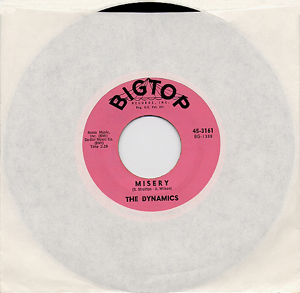 "Misery" 45
"Misery" 45
Joey Cyers was also recruited to play drums at the session when Lou Guido, the regular drummer for the Royal Playboys, suffered a broken leg. The pair had rehearsed with the Dynamics and the Royal Playboys for several weeks, so they were more than ready for the recording session that was engineered by Danny Dallas.
“Misery” and its flipside “I’m The Man” were recorded first. Buoyed by Cyer’s drumming and Bramlett’s lead guitar, the single is one of the best two-sided R&B records to come out of Detroit in the early 1960’s. Originally recorded for tiny Fox Records, it was soon leased for national distribution to Big Top, the label of both Del Shannon and Johnny and The Hurricanes. “Misery” was issued in the fall of 1963 and became an immediate hit in Detroit. The song spent all of November in the Top Ten of WKNR's Classic Top 30 Survey and did not drop out of the chart until the following month. "Misery" also did well nationally, spending a total of ten weeks on the charts and peaking # 44 on the Billboard Hot 100.
Two of Bramlett’s instrumental compositions were also recorded that day. "Goodbye Bo" b/w “Happy Hours” had to be issued under The Royal Playboys name in order to get the session paid for and the record released. The fact that the recordings were put out on the tiny DoDe label almost guaranteed limited distribution despite the fact that the song was a sizeable hit in Detroit. "Goodbye Bo" spent four weeks on WKNR's Classic Top 30 Survey, peaking at # 18, and one week at # 29 on CKLW's Big 30 Survey.
In late 1963 and early 1964, Bramlett and Cyers were basking in the glory of playing on two hits that were on Detroit radio. In a phone interview, Bramlett remembered that he was a passenger in Cyers' Corvette when they heard "Misery" come on the radio for the first time. They whooped it up, and rolled down the windows as they played the song full blast. 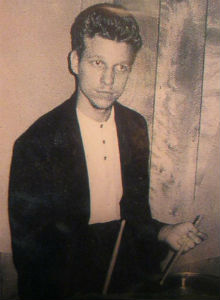 Joe Cyers 1963
Joe Cyers 1963
Bramlett and Cyers only played live with The Royal Playboys and The Dynamics one time. It was at a high school dance shortly after "Misery" had become a hit in Detroit. Billed as Cliff and Joe, they had a regular gig at the Escape Lounge on Greenfield and Joy in Detroit, and customers would bring in copies of both the “Misery” and “Goodbye Bo” 45s for them to autograph. They played basic rock and roll with an emphasis on Chuck Berry and Jimmy Reed covers and had people lined up outside the door and around the corner to see them. Cyers claimed that one night Detroit recording artists Jamie Coe and the Gigolos, who were playing down the street at the Club Gay Haven, came into the club to see who was stealing their crowd. Cyers discovered that his old band mate Richard Kolinowski was now a member of the Gigolos. It was also at the Escape Lounge that Cyers first started to sing and write songs.
Despite the money and adulation, the Cliff and Joe duo split up in 1964. Joey had become a union carpenter and could no longer play six nights a week and hold down a day job. Through the years, Cyers had messed around on the guitar at various rehearsals, but as the jam sessions in his basement continued, he discovered that he had an affinity for playing the guitar.
After graduating from Fordson High, Omar Tame enlisted in the Army and went on to play in the Army band. Following his discharge in 1964, Cyers invited him to come over to one of the jam sessions because he was thinking of putting together another band. He already had Stan Topij on keyboards, now that the Royal Playboys had broken up, and Tom Evenoff on bass. Tame arrived with his sax only to discover that Cyers wanted him to play drums so that he (Cyers) could play guitar and sing. Although Tame had never drummed before, Cyers offered to to show him how. Luckily, Tame had a natural sense of rhythm.
The line-up of Cyers, Topij, Evenoff and Tame jelled quickly, and soon the newly-named Joey D Band was playing blue-eyed soul music at The Village in Allen Park, and later in Detroit at Ed Wingate’s 20 Grand and in downriver clubs like the Roller Cave and Bob’s Bar. 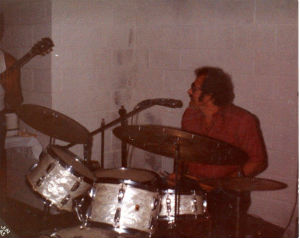 Stan Topij
Stan Topij
In 1964, it was still fairly easy to get an audition at Motown. It took place in Studio A at the Hitsville U.S.A. headquarters on West Grand River in Detroit. While each band member played in an isolation booth, the Motown people were listening carefully to each individual play. Omar had only been playing drums for about 6 months and said he was “sweating bullets” during the audition.
They passed the audition with flying colors, but instead of a recording act, Motown wanted them to be a backing band for their established stars when they went out to perform live. They also wanted Cyers to write for the label. Joey had been told by a member of Mike and The Modifiers, however, that songwriters at Motown sometimes earned very little. This was because credits were often divided among the many other folks who contributed to the final recording. As a result, Cyers and the Joey D Band turned Motown down.
The following year, The Dynamics reunited with Joey Cyers for a single on the Top Ten label. Cyers co-wrote and played drums on “Love To A Guy” which was backed with “Whenever I’m Without You”. The songs were recorded at Ernstat Recording on Livernois in Detroit, but the single failed to chart following its release in 1965. Tom Evenoff had, by this time, gotten married and left the band.
Ali Mapo, a recording artist for Fortune Records, saw the Joey D Band rehearsing at a store front in south Dearborn near where he lived. Mapo had released a single, “Promise Me Linda” b/w “You Don’t Know My Mind” on the Fortune subsidiary Strate-8 Records. He was impressed with the band’s cover of The Tams’ recent hit, “What Kind Of Fool (Do You Think I Am)” and a new Cyers’ composition they were working on titled “True True Love”. Mapo recommended that they go and audition at Fortune. 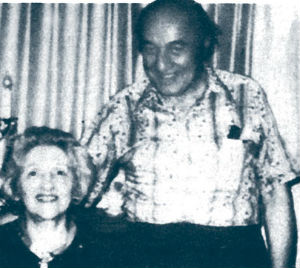 Devora and Jack Brown
Devora and Jack Brown
Jack and Devora Brown had established Fortune Records in 1947 with an investment of $3,000. Jack was an accountant and Devora was a talented pianist and aspiring songwriter. Their Fortune label recorded early sides by John Lee Hooker, but its first big success was with a country song called "Jealous Love" by the Davis Sisters (a duo that included future recording star Skeeter Davis). Devora Brown’s first important R&B discovery was a local Detroit vocal group called The Diablos, featuring their distinctive lead singer Nolan Strong. The group's signature song, “The Wind”, was recorded in 1954; but Fortune lacked the distribution needed to make it a national hit.
The Browns purchased the building at 3942 Third Avenue in 1955. The front of the cinder block structure was turned into a record shop where the Browns could sell the latest tunes as well as their own product. They quickly partnered with the Hi-Q Record Mart in this endeavor, and Hi-Q would eventually become a recording subsidiary of Fortune Records and the Brown’s Trianon Publications. 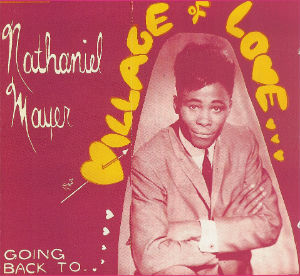
Although the label had limited distribution, Fortune had a national hit in 1962 when Nathaniel Mayer’s “Village Of Love” reached # 22 on Billboard’s Hot 100 and # 16 on Billboard’s R&B chart. According to Nathaniel Mayer's son, Monkeith, Willie Fleming played guitar on "Village Of Love". He also stated that the song was an even bigger hit in Cash Box, where it reached the Top Ten on the R&B chart.
Cyers described Devora Brown as very accommodating. She took the band through the record store to see the studio. The band at first thought they were being taken through the garage to get to the studio before they realized this was it! The studio had a hard-packed dirt floor, a space heater and a piano. Egg cartons and sponges were on the walls for sound-proofing, with drapes separating the studio from the record store.
Jack and Devora Brown loved “True True Love”, and they signed the band to a two-year recording contract with Fortune Records. But not until Devora had them change the name of the group to the more commercial sounding ‘Joey Day and The Dares’. 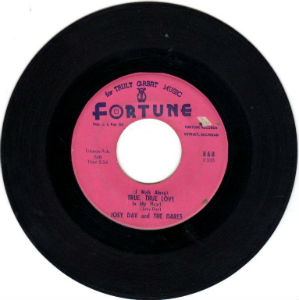 "True True Love" 45
"True True Love" 45
On May 10, 1965, Joey Day and The Dares recorded “True True Love” b/w “Talking About My Love”. Unlike other studios, the mikes were placed in front of the amplifiers and everything was done at the same time. The four-track recorder was located in a small control room, and when the recording process started all the lights would be turned out in the studio except for those in the control booth.
There would often be singers and musicians drinking on the curb while hanging around the Fortune record store/studio. Stan, Joey, and Omar ended up doing the recording along with a couple of winos from the street who sang the backing vocals for a few dollars.
Devora arranged package shows with other Fortune artists like Nolan Strong and The Diablos to play venues like Soul City and the Windsor Arena, as well as trips to the West Coast and Canada. The band was driven to gigs by Devora’s son, Sheldon Brown. They did a show at the Grande Ballroom one night with Frantic Ernie Durham that was broadcast live on radio. Also featured on the show were lip-synched performances by Smokey Robinson & The Miracles, Cannibal and The Headhunters, and Nathaniel Mayer. The audience was all black and the record seemed to do very well when the listeners thought Joey Day and The Dares were as well. “True True Love” had reached # 1 on WCHB and # 5 on WJLB, but after they started appearing before black audiences, the record dropped off the charts.
During their time at the label, they got to know several of the Fortune artists, especially Nolan Strong. Strong became a good friend and would often show up to jam with the band in Cyers’ basement. After announcing one night that they needed a piano, Strong offered to arrange for a couple of his buddies to steal the one from the Fortune studio and deliver it to Cyers. They wisely turned him down despite Strong’s assurances that no one would ever know.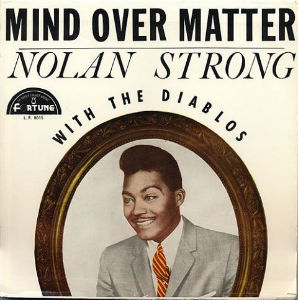
Joey recorded a unique solo version of Nolan Strong doing “Beside You”, the flipside of of his big Detroit hit, “Mind Over Matter”. It was recorded in Cyer’s basement studio accompanied only by Joey’s guitar. “Beside You” was one of Nolan’s favorite ballads, and he never failed to sing it at one of his performances. It’s a beautiful version, and hopefully it will be released sometime in the future.
Joey Day and the Dares only recorded the one single for Fortune, despite the fact that Devora Brown wanted them to do a follow-up. Looking back, Cyers and Tame claim that the reason was financial. The band was doing well before they signed, but soon discovered that they weren’t making any money at Fortune. After signing the contract, they now belonged to the label. Fortune owned the Joey Day and The Dares name and basically controlled when and where the band could play. This fact severely restricted the bar gigs that earned them the most money.
Fortune set up the promotional gigs with the understanding that the band would get paid when their record started making money. Omar Tame said they had fun while there and hung around quite a bit at the Third Avenue store, but he was married and had a wife and child to support and decided to leave the band and get a regular job.
After Joey Day and The Dares left Fortune, Cyers joined Denny Jordan and The Berkleys as the drummer. He recorded a single with the group, “Here I Come (Through The Door)” on Blanden Records and appeared with the group on the Swingin’ Time TV show in Windsor, Canada, with host Robin Seymour.
The jam sessions continued with a revolving set of musicians and friends. Archie Karapetian became friends with Stan, Omar, and Joe when he moved to East Dearborn to live with his dad in 1961. He was not really a musician, but hung around at the jam sessions and often traveled with the band, helping to get the crowd into the music with his dancing and doing impromptu comedy routines with Stan Topij, the clown in the band.
In 1972, Cyers, Topij, and some of the other regulars decided to make another single. The plan was to record in Cyer’s basement studio on his own four-track reel-to-reel recorder and put the 45 out on his own Gemni label. He formed his own publishing company, Cyers Music, and wrote a very commercial song called “I’m Gettin’ On Life”. Archie Karpetian contributed some lyrics, and the band released the record under the unusual name 'Wombat'.
Omar Tame was not on the record. The musicians were Joey Cyers on guitar and vocal, Stan Topij on drums, and Jim Wyjecka on bass. By 1972, it was difficult, if not impossible, to get airplay for a recording on a small independent label. Only 2,200 copies were pressed, but it is a much bootlegged 45 today due to its popularity as a Northern Soul record. 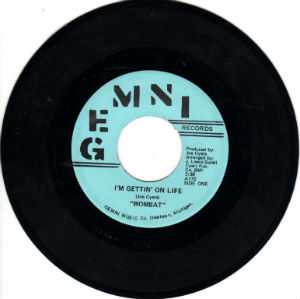 "I'm Gettin' On Life" 45
"I'm Gettin' On Life" 45
The Northern Soul music genre holds obscure R&B records in high regard. “I’m Gettin’ On Life” became a big dance floor hit at the Wigan Casino in Manchester, England. In 1978, Billboard magazine named Wigan Casino “The Best Disco in the World”. Cyers was then contacted by Move Records, a Manchester label that specializes in releasing music by black artists. The band decided not to sign with Move, and Wombat played the bar scene for several years before finally packing it in.
The members of Joey Day and The Dares had not been together many years until they had an unlikely reunion at Crazy Al’s Radio Party on WPON-AM. The connection was through Omar Tame’s wife who was a certified counselor for treatment of Alzheimer’s and the author of several books on the subject. They decided to advertise on the radio program. In the course of Crazy Al's interview, Omar was asked about what he did and he mentioned Joey Day and The Dares and “Misery”.
This led to an invitation for Omar, Stan Topij, and Joey Cyers to come on the show and be interviewed by Crazy Al and his on-air sidekick, Larry Matthews. They had a blast! Joey sang “True True Love” live on the air over the original recording, and they all told stories about Fortune and Devora Brown. Along with spinning several more of their records, Crazy Al related that back when he was a teenager in the early 60’s, he saw Stan Topij play keyboards in the Royal Playboys when they backed Joey Dee & The Starliters at the Walled Lake Casino. 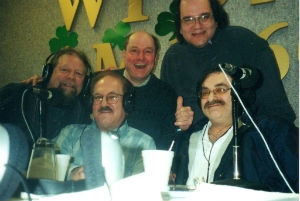 Joey Day & The Dares at WPON (L to R) Joey Cyers, Omar Tame, Crazy Al Schmitz, Larry Matthews, Stan Topij
Joey Day & The Dares at WPON (L to R) Joey Cyers, Omar Tame, Crazy Al Schmitz, Larry Matthews, Stan Topij
It was the last time the band would have the chance to be together. Sadly, Stan Topij passed away in 2003. Joey Cyers is retired and is now playing music just for fun. Archie Karapetian retired from Ford Engineering where he was employed as a millwright. Omar Tame has had a very successful career as an engineer and currently holds 50 patents from his design ideas for automotive inventions. Omar has been inspired by Joe Cyers’ basement studio to buy a new set of drums and start playing again.
Joey Day and the Dares were voted into the Michigan Rock and Roll Legends online Hall of Fame in 2013. Sadly, Joe Cyers passed away in 2020.
MRRl Hall of Fame: https://www.michiganrockandrolllegends.com/mrrl-hall-of-fame
Video: Listen to Joey Day and The Dares' "True True Love" on Fortune Records by clicking here: https://www.youtube.com/watch?v=5Av4CKBSx-k
